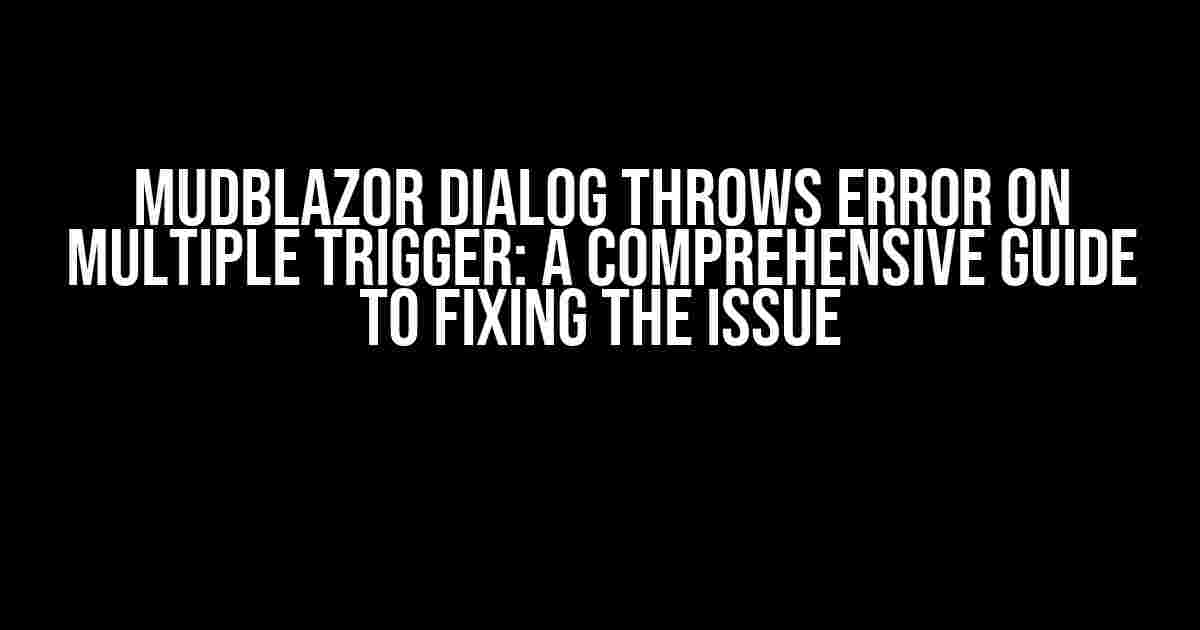If you’re a web developer using MudBlazor, you might have stumbled upon an infuriating issue where the MudBlazor dialog throws an error when triggered multiple times. Don’t worry; you’re not alone! In this article, we’ll delve into the root cause of the problem and provide a step-by-step guide to resolve it. Buckle up and let’s dive in!
Understanding the Problem
The MudBlazor dialog is an essential component for creating interactive and user-friendly interfaces. However, when triggered multiple times, it can throw an error, causing frustration and halting your development progress. The error message might look something like this:
"Error: MudDialog cannot be opened multiple times."
But what’s causing this error, you ask? Well, it’s quite simple: MudBlazor dialog is not designed to be opened multiple times. When you trigger the dialog, it creates an instance of the dialog component, and subsequent triggers attempt to create another instance, leading to the error.
Why Does it Happen?
Before we dive into the solution, let’s understand the reasons behind this behavior:
- Component instance limitation: MudBlazor dialog is designed to be a singleton component, meaning only one instance of the dialog can exist at a time. This limitation prevents multiple instances of the dialog from being created, leading to the error.
- Lack of garbage collection: When the dialog is closed, the instance is not properly garbage collected, leaving behind a “zombie” instance that prevents the creation of a new instance.
- Incorrect usage: Developers might unintentionally trigger the dialog multiple times, either through repeated button clicks or through programmatic triggers, causing the error.
Solution: The MudDialogProvider
Fortunately, MudBlazor provides a built-in solution to handle multiple dialog triggers: the `MudDialogProvider`. This provider enables you to manage dialog instances and ensure that only one instance is created at a time.
Step 1: Register the MudDialogProvider
In your MudBlazor application, add the following code to your `Main.razor` file:
<MudDialogProvider/>
This registers the `MudDialogProvider` as a service, making it available throughout your application.
Step 2: Create a Dialog Instance
In your component that triggers the dialog, inject the `MudDialogProvider` and create a dialog instance:
@code {
[CascadingParameter]
private MudDialogProvider _dialogProvider { get; set; }
private async Task OpenDialog()
{
var dialog = await _dialogProvider.Open<MyDialog>("My Dialog Title");
// Handle dialog result
}
}
In this example, we create a dialog instance using the `Open` method, passing the dialog type (`MyDialog`) and the dialog title as parameters.
Step 3: Handle Dialog Result
When the dialog is closed, the `Open` method returns a `DialogResult` object, which contains the result of the dialog operation. You can handle the result as needed:
@code {
private async Task OpenDialog()
{
var dialog = await _dialogProvider.Open<MyDialog>("My Dialog Title");
if (dialog.Result == DialogResult.Ok)
{
// Handle OK result
}
else if (dialog.Result == DialogResult.Cancel)
{
// Handle Cancel result
}
}
}
In this example, we handle the dialog result based on the `DialogResult` enum value.
Additional Tips and Tricks
To ensure you’re using the `MudDialogProvider` correctly, keep the following tips in mind:
- Avoid multiple triggers: Refrain from triggering the dialog multiple times, as this can lead to unexpected behavior. Instead, use a single trigger and handle the dialog result accordingly.
- Dispose of dialog instances: When you’re done with the dialog, make sure to dispose of the instance using the `MudDialogProvider.Close` method:
await _dialogProvider.Close(dialog);
- Use the correct dialog type: Ensure you’re using the correct dialog type when creating a dialog instance. If you’re using a custom dialog, make sure to register it in your `Main.razor` file:
<MudDialogProvider> <MyDialog/> </MudDialogProvider>
Conclusion
In conclusion, the MudBlazor dialog throws an error on multiple triggers due to component instance limitations and incorrect usage. By understanding the root cause and using the `MudDialogProvider`, you can easily manage dialog instances and prevent errors. Remember to register the provider, create a dialog instance, handle dialog results, and follow the additional tips and tricks to ensure a seamless user experience.
| Keyword | Description |
|---|---|
| MudBlazor Dialog | A component for creating interactive dialog windows in MudBlazor. |
| MudDialogProvider | A built-in provider for managing dialog instances in MudBlazor. |
| DialogResult | An enum value representing the result of a dialog operation. |
Now, go ahead and create engaging dialog interfaces with MudBlazor, error-free!
Here is the HTML code for 5 Questions and Answers about “MudBlazor Dialog throws error on multiple trigger” in a creative voice and tone:
Frequently Asked Question
Got stuck with MudBlazor Dialog throwing errors on multiple triggers? Worry not, we’ve got you covered!
Why does MudBlazor Dialog throw an error when triggered multiple times?
MudBlazor Dialog throws an error on multiple triggers because it’s not designed to handle multiple instances simultaneously. When you trigger the dialog multiple times, it tries to render multiple instances, causing a conflict and resulting in an error.
How can I prevent the error from occurring?
To prevent the error, you can use the `DialogService.CancelAll()` method to cancel any existing dialog instances before opening a new one. This ensures that only one instance of the dialog is open at a time.
Can I use a single instance of the dialog for multiple triggers?
Yes, you can use a single instance of the dialog for multiple triggers by using the `DialogService.Show()` method with the same dialog instance. This way, you can reuse the same dialog instance for multiple triggers, avoiding the error.
What if I have different dialog content for each trigger?
If you have different dialog content for each trigger, you can create separate dialog instances for each trigger and use the `DialogService.Show()` method to display the corresponding dialog instance. This way, you can have multiple dialog instances with different content, each triggered independently.
Are there any workarounds for older versions of MudBlazor?
Yes, for older versions of MudBlazor, you can use the `DialogService.GetDialog()` method to get a reference to the current dialog instance and check if it’s already open before opening a new instance. This can help prevent the error from occurring on multiple triggers.

